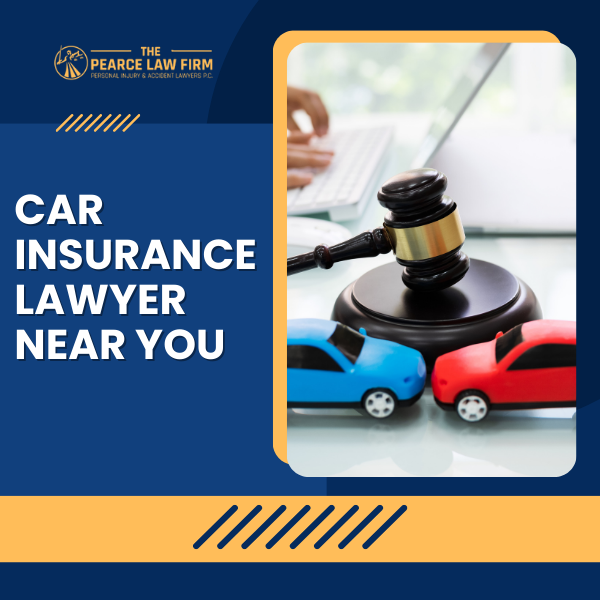Philadelphia Lawyers That Sue Car Insurance Companies Near You
The experienced Philadelphia car insurance lawyers at The Pearce Law Firm are dedicated to representing victims in insurance disputes and protecting their rights against insurance companies. Edith Pearce, the founder of The Pearce Law Firm, brings over 10 years of experience as an attorney working for insurance companies and defense firms. After years of defending insurance companies, she pivoted her career to focus on helping injured victims, creating a practice designed specifically for their needs.
With her extensive background in insurance law, Edith Pearce offers our team valuable insights into the legal processes and tactics employed by insurance company legal teams during litigation. This expertise gives us a unique advantage when navigating the complexities of auto insurance claims. Our firm’s comprehensive knowledge allows us to strategize effectively and defend our clients’ rights in auto insurance disputes.
At The Pearce Law Firm, we are committed to fighting for our clients’ rights without the burden of upfront costs. Our No Win, No Fee Guarantee ensures that victims can reach out to a Philadelphia auto insurance dispute attorney without worrying about legal fees, unless we secure a settlement on their behalf.
If you are looking for expert car insurance legal advice, the experienced car insurance lawyers at our firm are here to assist. Get the support you need from a trusted lawyer near you, specializing in insurance disputes and claims.

Pennsylvania Auto Insurance Requirements
Most people drive, own a vehicle, and know that auto insurance is required by the government. But how many truly understand what they are paying for and whether their car insurance policy is adequate?
With over 20 years of experience in auto insurance law, I’ve observed that approximately 75% of people I meet—regardless of their background or sophistication—don’t fully comprehend what their auto insurance policies actually cover or if they are sufficiently addressing their needs. This lack of understanding often originates from how the insurance policy was initially acquired.
In many households, one individual manages the purchase of the insurance, while the other simply agrees to it, unaware of the specifics of the policy. In circumstances such as divorce or the death of a spouse, the surviving individual might continue with the same auto insurance policy without realizing whether it still offers the correct coverage.
It’s also common for individuals to maintain a policy they bought years ago, perhaps when they were younger and owned their first vehicle. As life changes—such as acquiring a new car, family changes, or other major life events—those old policies may no longer provide the necessary coverage, leaving individuals underinsured or inadequately protected.
Understanding your auto insurance policy is critical. It’s not just about fulfilling legal requirements; it’s about making sure you’re fully protected in your specific situation. If you haven’t reviewed your coverage in a while, now is a great time to reassess and make sure your policy truly meets your needs.
What You Need to Know About Auto Insurance Coverage
In today’s world, many individuals purchase auto insurance online or simply renew the car insurance policy they’ve had for years without re-evaluating their coverage. While Pennsylvania law mandates automobile insurance, it’s important to understand that the government’s primary focus is not your personal protection but rather ensuring that others are covered if you cause an accident. Understanding this distinction is crucial to evaluating your coverage and ensuring that you have the right protection.
Government Insurance Requirements vs. Your Protection
Pennsylvania’s minimum insurance requirements primarily focus on bodily injury liability, which covers damages to others if you’re at fault in an accident. Here’s what that means:
- Bodily Injury Liability ($100,000/$300,000):
- $100,000 covers injuries per person involved in the accident.
- $300,000 is the maximum payout for all injuries from one accident.
However, it’s important to note that any damages beyond these limits are your responsibility, a fact that’s often overlooked until it’s too late.
What the Government Requires for You
The only mandatory coverage that benefits you directly is medical expenses. Pennsylvania law requires a minimum of $5,000 in medical coverage, which covers:
- Emergency room visits
- Doctor’s bills
- Other medical treatments following an accident
Unlike health insurance, this coverage has no deductible, meaning it pays out immediately for covered medical expenses. Many policies offer $10,000 in medical coverage, which is a better option considering the high costs of care today. Once this amount is exhausted, however, any additional costs become your responsibility, either through health insurance or out-of-pocket payments.
Funeral Expenses
Most auto insurance policies include a small amount for funeral expenses, which typically covers basic costs following an accident.
Uninsured and Underinsured Motorist Coverage: Why You Need It
These optional coverages are crucial for protecting yourself in the event of an accident:
- Uninsured Motorist Coverage: This protects you if you’re injured by a driver who doesn’t have insurance. If the at-fault driver has let their policy lapse or has no insurance at all, this coverage ensures that you aren’t left vulnerable.
- Underinsured Motorist Coverage: This coverage steps in when the at-fault driver has insufficient insurance. For example, Pennsylvania’s minimum coverage of $15,000 per person can be exhausted quickly in the case of serious injuries, leaving you to pay the difference. Underinsured coverage helps bridge this gap, ensuring you aren’t left with significant financial burdens.
Why These Protections Matter
Without this additional coverage, you could face substantial financial consequences after an accident. While uninsured and underinsured motorist coverage may seem like small additions to your policy, they are essential safeguards, especially as medical costs continue to rise and the minimum insurance requirements fall short of providing full protection.
- Medical Expenses: Having at least $10,000 in medical coverage ensures you and your passengers won’t face unexpected out-of-pocket costs if you’re injured in an accident.
- Stacked Coverage: If you have more than one vehicle on your policy, stacked coverage multiplies your uninsured motorist protection by the number of vehicles. For instance, if you have two cars, you’d get $1 million in coverage for uninsured motorist protection. Note that stacked coverage is not available if you have only one vehicle on the policy.
- Umbrella Insurance: Umbrella insurance offers additional coverage above and beyond your regular auto insurance policy, protecting you from accidents and liabilities that exceed your current policy limits.
Make sure you understand the various types of coverage available, including stacked and uninsured motorist protection, to ensure you are fully protected in case of an accident.
Take Action: Review Your Auto Insurance Policy Today
- Check Your Medical Coverage: Ensure you have at least $10,000 in medical coverage to avoid costly out-of-pocket expenses.
- Add or Increase Uninsured/Underinsured Coverage: Ensure you’re adequately protected from others with insufficient coverage.
- Stay Informed: The first step in ensuring you’re fully protected is understanding your policy. Take the time to review and make necessary adjustments.
Auto insurance isn’t just about complying with legal requirements—it’s about securing your financial future and ensuring you have the coverage you need. Take a moment to review your policy and make sure it’s properly tailored to your unique needs.
Understanding Your Rights and Coverage in Auto Insurance
When it comes to auto insurance, the government’s primary concern is protecting others from the harm you might cause—not necessarily ensuring your personal protection. This focus explains why certain mandates exist but also why the system allows individuals to unintentionally compromise their own coverage.
How the System Works
Insurance companies are required by law to offer you the same level of protection for yourself as you purchase to protect others. For instance, if you select liability coverage of $100,000/$300,000, the insurer must provide you with the option to have equivalent coverage for yourself under uninsured and underinsured motorist coverage.
However, this critical detail is often poorly explained to policyholders, leading to significant misunderstandings.
A Common Mistake
Take this example: A policyholder purchased $100,000/$300,000 liability coverage to protect others but only opted for $15,000/$30,000 coverage for themselves under uninsured and underinsured motorist provisions. Essentially, this person unknowingly bought less coverage for their own protection than they did for everyone else.
This happens more often than you might think. People commonly say, “I would never have chosen less coverage for myself if someone had explained it that way.”
What You Need to Do
- Review Your Policy Carefully:
- Check the limits for uninsured and underinsured motorist coverage.
- Ensure these amounts match your liability coverage or are at a level that adequately protects you.
- Ask Questions:
- Don’t hesitate to clarify terms with your insurance provider.
- Make sure you understand how each type of coverage works and who it protects.
- Prioritize Your Protection:
- Remember, while the government mandates coverage to protect others, you are responsible for making sure you’re properly protected.
Avoid This Common Pitfall
Don’t settle for the bare minimum or assume that your policy automatically prioritizes your best interests. Ensuring your personal coverage matches your liability coverage is a simple step that can prevent significant financial and personal hardship.
Take the time to evaluate your policy and make informed choices. You deserve the same level of protection you’re providing for others.
What Happens in an Auto Accident: Protecting Yourself from the Unexpected
Auto accidents are something we all hope to avoid. Unfortunately, no matter how careful we are behind the wheel, accidents can happen. Whether it’s bad weather, someone not paying attention, or, worse yet, distracted driving—injuries are a real and increasing risk on the road.
How many times have you stopped at a traffic light and looked over to see the driver next to you with their head down, possibly texting? Or, while driving on a two-lane highway, you notice another vehicle swerving out of its lane because the driver isn’t paying attention? Distracted driving is becoming more common, and the consequences are severe.
Injuries caused by distracted driving are rising exponentially, as more and more people fail to focus on the road.
No matter how cautious you are as a driver, you can’t control the actions of others. A momentary lapse in attention by another driver can lead to serious consequences. That’s why it’s crucial to ensure that your auto insurance provides enough coverage to protect you in the event of an accident, especially one caused by a distracted driver.
While you can’t control what happens on the road, you can control how well you’re protected when the unexpected occurs. Make sure your policy covers both the minimum and any additional protections you might need to safeguard your well-being.
Auto Insurance: What Pennsylvania Drivers Need to Know About Crossing State Lines
If you frequently drive in New Jersey, it’s important to understand how auto insurance laws differ. While Pennsylvania drivers may have Full Tort coverage, in New Jersey, that could be treated as Limited Tort, affecting your rights to sue for non-serious injuries.
Additionally, medical coverage works differently in New Jersey, with deductibles and co-pays. However, you can choose to have your medical bills handled under Pennsylvania law, which avoids those extra costs.
For drivers in New Jersey, the medical coverage cap is $250,000. This can be helpful if you don’t have health insurance, but less ideal if you do.
Always be informed about how your coverage works across state lines and ask your insurer about the options available when driving in New Jersey.
Full Coverage vs. Full Tort: What You Need to Know About Pennsylvania Auto Insurance
In Pennsylvania, many drivers mistakenly think “Full Coverage” means complete protection. In reality, it only refers to meeting the minimum legal requirements. This includes liability and some basic protections, but it doesn’t necessarily mean you have comprehensive coverage.
Full Tort vs. Limited Tort: The Key Difference
The real distinction comes between Full Tort and Limited Tort. With Full Tort, you retain your right to pursue compensation for injuries, no matter their severity. This includes pain, suffering, and lost wages.
In contrast, Limited Tort means you waive your right to compensation for non-serious injuries. If an injury is deemed not serious by a judge or court, you may not be able to recover damages for pain and suffering, even if the injury impacts your life significantly.
Limited Tort may seem like a way to save money, but it limits your ability to recover if you suffer long-term pain or life changes due to an injury. For example, if you can no longer do things you love—like playing piano or caring for your grandchildren—Limited Tort may prevent you from claiming damages for those losses.
With Full Tort, you keep your full rights to compensation, regardless of injury severity. This means you’re protected if you experience long-term or non-visible injuries.
The difference in cost is often minor—around $20-$40 per month or about $200 annually. While it may go as high as $1,000 per year depending on your coverage, it could save you from significant financial strain in the future.
Exceptions to Limited Tort
Even with Limited Tort, there are key exceptions:
- Accidents involving a drunk driver
- Out-of-state drivers
- Pedestrian accidents
- Intentional acts
In these cases, you can still pursue compensation for your injuries.
Choosing the right option depends on your lifestyle, health, and risk tolerance. As you age or experience physical changes, the likelihood of lasting injuries increases. What seems like a small cost now could offer significant protection later.
The Impact of Degenerative Conditions on Injury Claims: Full Tort vs. Limited Tort
As we age, it’s natural to experience some degree of degeneration in our spine, joints, hands, and neck. Conditions like herniated discs are common and, in many cases, don’t cause significant issues. However, an accident can exacerbate these pre-existing conditions, turning what was once a minor issue into a source of severe pain.
This is where the difference between Full Tort and Limited Tort becomes crucial. Under Full Tort, you retain the right to pursue compensation for injuries, regardless of whether they were aggravated by an existing condition. On the other hand, with Limited Tort, the insurance company or a judge determines whether your injury is “serious” enough to warrant compensation.
The real challenge arises when pre-existing conditions—such as degenerative spine or joint issues—are worsened by an accident. Limited Tort can make it much harder to prove that the injury is significant, even if the pain is new or more intense. This is why understanding the difference between Full Tort and Limited Tort is especially important for those with any history of degenerative conditions.
What to Do Next
- Ask for a Comparison: Your insurer is required to provide a breakdown of the costs for both options.
- Consider Your Needs: Think about your health and lifestyle. Would you want full protection if something unexpected happens?
- Review Your Policy: Don’t just rely on marketing claims. Ensure you fully understand your coverage.
- Consult an Attorney: If you’re unsure, consider having an attorney review your policy to ensure you’re fully covered.
Insurance is about more than meeting state requirements—it’s about protecting your future. Whether you choose Full Tort or Limited Tort, make sure you’re making an informed choice that best protects you and your family.
Understanding Umbrella Insurance and Its Role in Protecting Your Assets
Umbrella insurance provides extra coverage beyond the limits of your primary auto or homeowners policy. It can protect your assets in the event of a significant accident, particularly if your standard policy limits are exceeded. Umbrella policies are often inexpensive (around $100–$200 per year) but can be crucial if you’re at risk of a large lawsuit. While not everyone will need one, having coverage when you do need it can make a huge difference.
How Umbrella Insurance Works:
- If you’re in an accident caused by an uninsured driver, your standard insurance may only cover up to your policy’s limits.
- Umbrella insurance kicks in when your primary coverage is exceeded, protecting you from personal financial liability.
- For example, if an accident causes $500,000 in damages, but your auto policy only covers $300,000, umbrella insurance would cover the remaining $200,000.
Umbrella insurance does not cover deductibles. Deductibles are handled separately, and you can adjust them to help control your policy costs.
In Pennsylvania, marital assets are typically protected from being seized in the event of a lawsuit. However, if you become a widow, widower, or divorcee, this protection may no longer apply. In such cases, it’s important to consider an umbrella policy to safeguard your assets.
As your life changes—whether through marriage, divorce, or asset accumulation—it’s important to review your insurance coverage and consider adding an umbrella policy to ensure full protection for your assets.
Benefits of Hiring a Philadelphia Auto Insurance Lawyer Near You
Insurance Claims Lawyers: Vital Legal Support for Auto Insurance Disputes
Insurance claims lawyers provide crucial legal support and strategic representation for individuals injured due to the negligence or wrongdoing of others. Working with an experienced auto insurance dispute attorney can significantly improve your outcome in both legal proceedings and financial recovery. Here are the key benefits of hiring a Pennsylvania insurance lawyer from The Pearce Law Firm Personal Injury & Accident Lawyers, P.C.:
Experience and Legal Expertise
Insurance dispute attorneys possess deep knowledge of auto insurance law and claim processes. Their legal training and courtroom experience enable them to interpret insurance policies, navigate complex legal systems, and challenge unjust claim denials. Our team is skilled at gathering evidence, building strong cases, and negotiating with insurance adjusters to maximize client compensation. With prior experience representing insurance companies, we bring insider knowledge that offers a unique advantage in handling auto insurance disputes.
Dedicated Legal Representation
Insurance companies employ seasoned legal teams to defend their interests. You deserve a car insurance lawyer who will advocate just as aggressively on your behalf. Our attorneys ensure you are treated fairly and that your legal rights are fully protected during settlement negotiations or litigation. Whether you’re dealing with a denied claim, underpayment, or bad faith practices, we’re here to fight for you.
Increased Chances of Legal Success
Individuals who pursue insurance claims with qualified legal representation typically secure better outcomes—both in terms of settlement amounts and judgment success rates. A knowledgeable insurance attorney knows how to craft compelling arguments, present credible evidence, and apply pressure when needed. Hiring a lawyer to sue an insurance company often leads to more substantial compensation for victims of auto accidents or insurance disputes.
Maximized Financial Compensation
If you’ve suffered injuries due to another party’s negligence, you may be entitled to financial compensation for:
- Medical expenses
- Lost wages
- Pain and suffering
- Property damage
A Philadelphia car insurance claim lawyer from our team can help ensure that all recoverable damages are pursued and accounted for. We work to secure the full value of your claim—not just what the insurer initially offers.
Reduced Stress and Peace of Mind
Legal disputes can be emotionally and physically draining—especially when you’re recovering from an injury. Hiring an auto insurance lawyer allows you to focus on your health and recovery while we handle the paperwork, communications, and court procedures. Our team works diligently behind the scenes to protect your interests and bring peace of mind throughout the legal process.
Efficient and Time-Saving Legal Support
Handling an insurance dispute on your own can be incredibly time-consuming. From filing legal documents to negotiating with insurers, the process is filled with delays and complications. Our lawyers manage the full scope of your case, saving you time and energy. You won’t need to deal with frustrating phone calls, endless forms, or complex legal jargon—we’ve got it covered.
Contingency Fee Structure (No Win, No Fee)
Most auto insurance lawyers in Philadelphia, including our firm, work on a contingency fee basis. This means:
- No upfront legal fees
- No payment unless we win your case
- Legal representation is accessible to clients with limited financial resources
This ensures that anyone needing help with insurance claims can access skilled legal support, regardless of financial circumstances.
Local Expertise You Can Trust
Edith Pearce, Esq., founder of The Pearce Law Firm, brings over a decade of experience from inside the insurance industry. Now dedicated to helping victims, she leads a team of seasoned professionals focused on fair outcomes and justice. Whether you’re in Pennsylvania or need a New Jersey insurance dispute lawyer, we’re here to help.
Contact a Philadelphia Car Insurance Lawyer Near You
Contact us today (24/7) to learn more about your legal options with your car insurance case. If you have been in a Philadelphia car accident or need to obtain auto insurance legal advice in Philadelphia, The Pearce Law Firm car insurance lawyers are here to help. The Pearce Law Firm Personal Injury & Accident Lawyers, P.C. are always ready and willing to fight insurance companies for the compensation you deserve.
Review of Our Auto Insurance Dispute Attorney in Philadelphia
Rating 5/5 ⭐⭐⭐⭐⭐
“We had a wonderful experience with Nicole Vitale and Edith Pearce at the Pearce Law Firm. After my husband was in a car accident, their office assisted us with understanding our insurance claim, health care, and repairs. Edith and Nicole kept us informed throughout the process, answered all of our questions, and exceeded our expectations. We would highly recommend their services!” -Michelle R.
See our 4.8 rating and read more of our 91+ reviews on Google!









